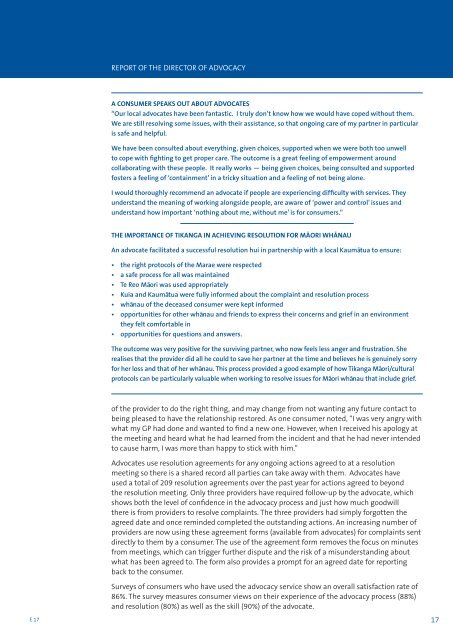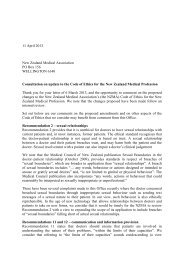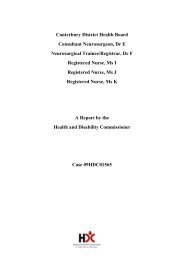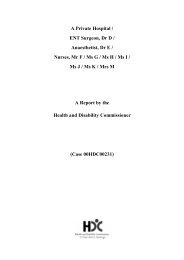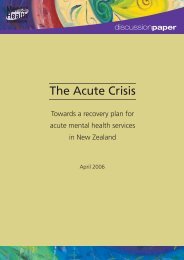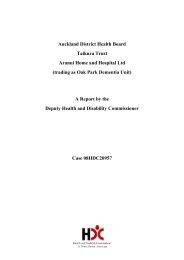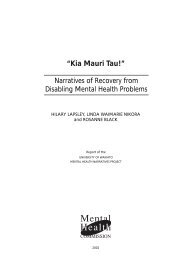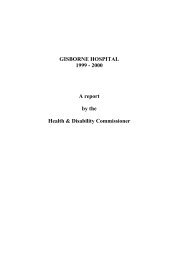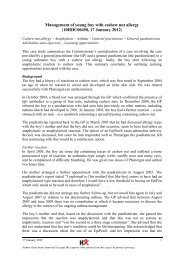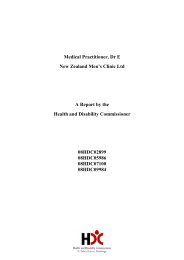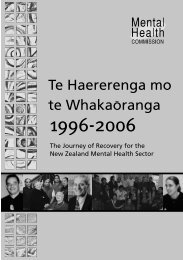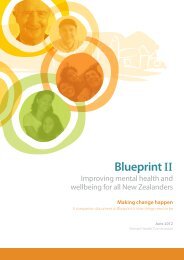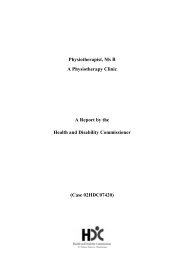Annual Report for the year ended 30 June 2009 - Health and ...
Annual Report for the year ended 30 June 2009 - Health and ...
Annual Report for the year ended 30 June 2009 - Health and ...
Create successful ePaper yourself
Turn your PDF publications into a flip-book with our unique Google optimized e-Paper software.
REPORT OF THE DIRECTOR OF ADVOCACY<br />
A CONSUMER SPEAKS OUT ABOUT ADVOCATES<br />
“Our local advocates have been fantastic. I truly don’t know how we would have coped without <strong>the</strong>m.<br />
We are still resolving some issues, with <strong>the</strong>ir assistance, so that ongoing care of my partner in particular<br />
is safe <strong>and</strong> helpful.<br />
We have been consulted about everything, given choices, supported when we were both too unwell<br />
to cope with fighting to get proper care. The outcome is a great feeling of empowerment around<br />
collaborating with <strong>the</strong>se people. It really works — being given choices, being consulted <strong>and</strong> supported<br />
fosters a feeling of ‘containment’ in a tricky situation <strong>and</strong> a feeling of not being alone.<br />
I would thoroughly recommend an advocate if people are experiencing difficulty with services. They<br />
underst<strong>and</strong> <strong>the</strong> meaning of working alongside people, are aware of ‘power <strong>and</strong> control’ issues <strong>and</strong><br />
underst<strong>and</strong> how important ‘nothing about me, without me’ is <strong>for</strong> consumers.”<br />
THE IMPORTANCE OF TIKANGA IN ACHIEVING RESOLUTION FOR MĀ ORI WHĀ NAU<br />
An advocate facilitated a successful resolution hui in partnership with a local Kaumātua to ensure:<br />
• <strong>the</strong> right protocols of <strong>the</strong> Marae were respected<br />
• a safe process <strong>for</strong> all was maintained<br />
• Te Reo Māori was used appropriately<br />
• Kuia <strong>and</strong> Kaumātua were fully in<strong>for</strong>med about <strong>the</strong> complaint <strong>and</strong> resolution process<br />
• whānau of <strong>the</strong> deceased consumer were kept in<strong>for</strong>med<br />
• opportunities <strong>for</strong> o<strong>the</strong>r whānau <strong>and</strong> friends to express <strong>the</strong>ir concerns <strong>and</strong> grief in an environment<br />
<strong>the</strong>y felt com<strong>for</strong>table in<br />
• opportunities <strong>for</strong> questions <strong>and</strong> answers.<br />
The outcome was very positive <strong>for</strong> <strong>the</strong> surviving partner, who now feels less anger <strong>and</strong> frustration. She<br />
realises that <strong>the</strong> provider did all he could to save her partner at <strong>the</strong> time <strong>and</strong> believes he is genuinely sorry<br />
<strong>for</strong> her loss <strong>and</strong> that of her whānau. This process provided a good example of how Tikanga Māori/cultural<br />
protocols can be particularly valuable when working to resolve issues <strong>for</strong> Māori whānau that include grief.<br />
E.17<br />
of <strong>the</strong> provider to do <strong>the</strong> right thing, <strong>and</strong> may change from not wanting any future contact to<br />
being pleased to have <strong>the</strong> relationship restored. As one consumer noted, “I was very angry with<br />
what my GP had done <strong>and</strong> wanted to find a new one. However, when I received his apology at<br />
<strong>the</strong> meeting <strong>and</strong> heard what he had learned from <strong>the</strong> incident <strong>and</strong> that he had never int<strong>ended</strong><br />
to cause harm, I was more than happy to stick with him.”<br />
Advocates use resolution agreements <strong>for</strong> any ongoing actions agreed to at a resolution<br />
meeting so <strong>the</strong>re is a shared record all parties can take away with <strong>the</strong>m. Advocates have<br />
used a total of 209 resolution agreements over <strong>the</strong> past <strong>year</strong> <strong>for</strong> actions agreed to beyond<br />
<strong>the</strong> resolution meeting. Only three providers have required follow-up by <strong>the</strong> advocate, which<br />
shows both <strong>the</strong> level of confidence in <strong>the</strong> advocacy process <strong>and</strong> just how much goodwill<br />
<strong>the</strong>re is from providers to resolve complaints. The three providers had simply <strong>for</strong>gotten <strong>the</strong><br />
agreed date <strong>and</strong> once reminded completed <strong>the</strong> outst<strong>and</strong>ing actions. An increasing number of<br />
providers are now using <strong>the</strong>se agreement <strong>for</strong>ms (available from advocates) <strong>for</strong> complaints sent<br />
directly to <strong>the</strong>m by a consumer. The use of <strong>the</strong> agreement <strong>for</strong>m removes <strong>the</strong> focus on minutes<br />
from meetings, which can trigger fur<strong>the</strong>r dispute <strong>and</strong> <strong>the</strong> risk of a misunderst<strong>and</strong>ing about<br />
what has been agreed to. The <strong>for</strong>m also provides a prompt <strong>for</strong> an agreed date <strong>for</strong> reporting<br />
back to <strong>the</strong> consumer.<br />
Surveys of consumers who have used <strong>the</strong> advocacy service show an overall satisfaction rate of<br />
86%. The survey measures consumer views on <strong>the</strong>ir experience of <strong>the</strong> advocacy process (88%)<br />
<strong>and</strong> resolution (80%) as well as <strong>the</strong> skill (90%) of <strong>the</strong> advocate.<br />
17


